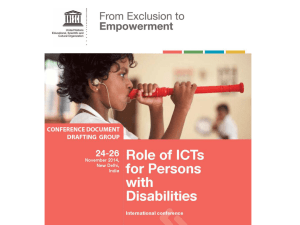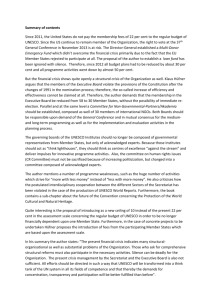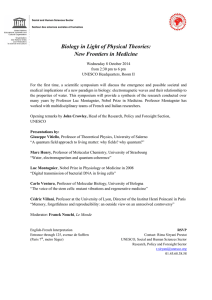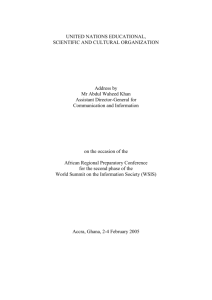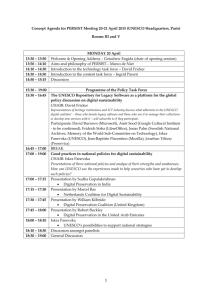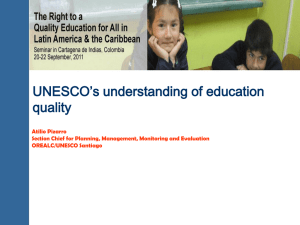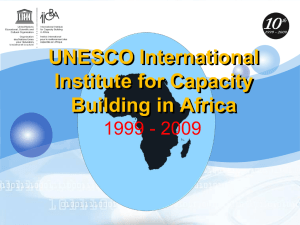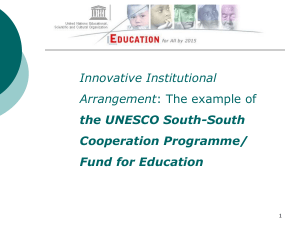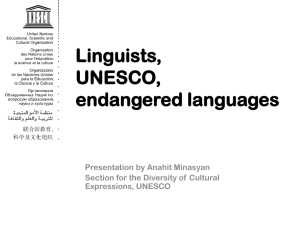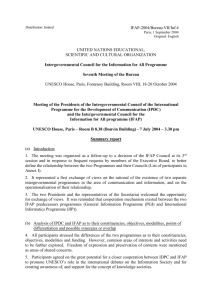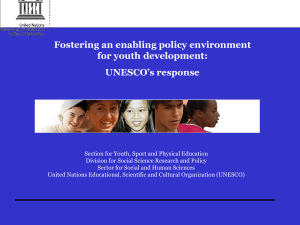Presentation by Indrajit Banerjee
advertisement
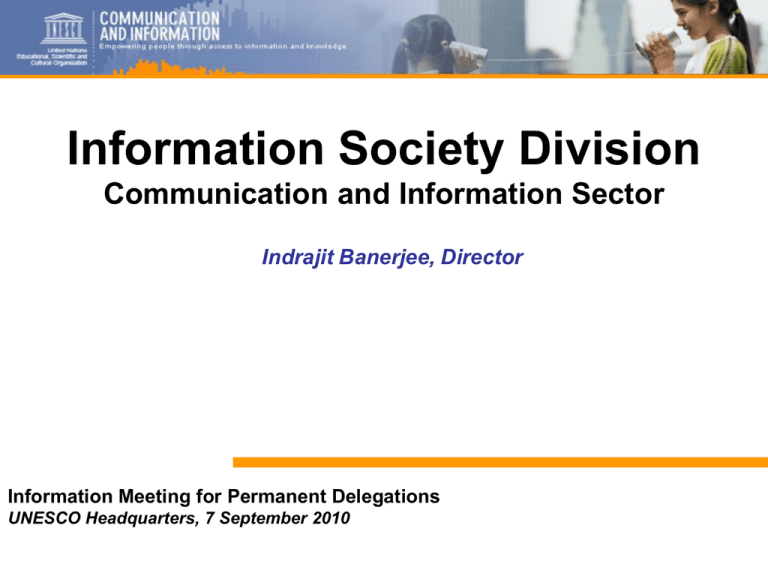
Information Society Division Communication and Information Sector Indrajit Banerjee, Director Information Meeting for Permanent Delegations UNESCO Headquarters, 7 September 2010 1 Information Society Division – 35 C/5 Biennial sectoral priority 2 Building capacities for universal access to information and knowledge Main Line of Action 3 Fostering universal access to information and knowledge and the development of infostructures 2 UNESCO OER Platform What are Open Educational Resources (OERs): Learning especially eLearning resources and tools in open document format and released under an intellectual property licence allowing free use and re-use What is the UNESCO OER Platform: New, innovative web-based Platform Offering UNESCO products and adaptations as OER Allowing UNESCO stakeholders to freely find, compare, and build and share their unique adaptations Supports offline editing and access by mobile phone 3 4 Open Training Platform (OTP) Online directory of 3,400+ freely accessible e-learning courses 21 subject areas 9 UN partner agencies (ITU, UNEP, UNITAR, UNU, FAO, WHO, ILO, UNV and UNESCO) 630+ training providers: GO, NGOs, private sector 1M+ visitors (since 2007); 4,800 portal members 2010-2011: renovated OTP handling multilingual interfaces and learning resources to include all UNESCO material www.opentrainingplatform.org 5 6 Open Access (OA) to scientific information Focus on OA Journals and Repositories Developing countries universities, think tanks, research institutions, Government policy units Undertake 2010 Global Map (online from 2011) Awareness and links to existing global OA respositories Building capacities to create dynamic, viable local OA repositories 7 8 Free and Open Source Software (FOSS) UNESCO FOSS Portal – http://www.unesco.org/webworld/portal_freesoft/ Supported development of affordable quality software for information processing (e.g. CDS/ISIS, IDAMS) as well as FOSS projects, such as Greenstone, Koha, AtoM, mostly through localization of software and manuals Promotion of development and use of Open Standards in IT infrastructures and content (ODF) 2010-2011: renovated FOSS Portal focusing on UNESCO related themes and priorities, such as ICT in Education, Accessibility, Gender, Disaster prevention and recovery, and more. 9 10 Memory of the World Programme Libraries, archives and, increasingly, museum documentary collections are part of the Memory of the World Programme Strategic objectives are the preservation of all forms of recorded documentary heritage to ensure permanent access to the content. The Programme works with the major NGOs active in the library, archives and museum fields to produce and disseminate recommendations for the preservation of heritage, including in the area of digital heritage, one of the major concerns of the 21st century. 11 Memory of the World Programme (2) International Register – 193 items of global significance Manuscript, Germany Kelly Gang. Australia Palestine refugee children schools, UNRWA Jikji Memory of the World Prize – Funded by Republic of Korea: Cheongju City – $30,000 every two years – Outstanding work in preservation by individuals or institutions 12 World Digital Library Objectives – Promote international and intercultural understanding and awareness – Expand multilingual and culturally diverse content on the Internet Provide resources to educators and contribute to scholarly research Build knowledge and capacity in the developing world Statistics – 89 partners from some 59 countries; – Spanish (52%) the most widely used language (English only 24%). – More than 10 million visitors since its official launch in April 2009 http://www.wdl.org 13 Information for All Programme (IFAP) Established in 2001 to provide a platform for international policy discussions and guidelines for action in the area of access to information and knowledge. The 180th Executive Board confirmed its strong commitment to the Information for All Programme and endorsed its Strategic Plan for the period 2008-2013. Priorities – – – – – Information for Development Information Literacy Information Preservation Information Ethics Information Accessibility 14 IFAP - Key achievements IFAP has developed National Information Society Policy: A Template, a document designed to assist Member States in the formulation of national information policy frameworks. IFAP Information Society Observatory, accessible online. Created with the financial support of IFAP and continuously updated with new, relevant documents, events, books and experiences, annotations and links. Implementation of several projects funded by the IFAP Special Fund for a total of US$ 210,000 Creation of new National IFAP Committees (Poland, Ivory Coast, Chile, Nigeria and Germany) the organization of IFAP-related meetings and events: – A sub-regional forum on Information for All, The Philippines – Information Ethics and e-Government High Level Executive Seminar and training workshop, South Africa – The first Consultation Meeting of National Committees, Russia 15 Multilingualism and Universal Access to Cyberspace Implementation of the normative instrument Recommendation concerning the Promotion and Use of Multilingualism and Universal Access to Cyberspace: – supporting the development of a multilingual cyberspace – offering possibilities for the preservation of endangered languages – supporting pilot projects and the development of multilingual content management tools and resources – enhancing and strengthening policy formulation, information dissemination, research and pilot projects in that field – promoting wider and more equitable access to information networks and services – reaffirming the equitable balance between the interests of the rights-holders and the public interest 16 Social inclusion and education opportunities for persons with disabilities through ICTs About 10% of the world’s population have some form of disability; there are an estimated 150 million children in the world with disabilities, about four-fifths of them in developing countries; millions more live with disabled parents or relatives. WSIS Declaration of Principles: “In building the Information Society, we shall pay particular attention to the special needs of marginalized and vulnerable groups of society (…) We shall also recognize the special needs of older persons and persons with disabilities.” Priority actions: – Developing inclusive policies – Developing an enabling environment and enhance social inclusion – Addressing major challenges 17 WSIS follow-up highlights WSIS Forum 2010 co-facilitated – 5 days, 13 events – 700 participants, 1,500 participating at a distance Inclusive Knowledge Societies concept advanced – expert meeting (March 2010) Publications launched – Fostering Information and Communication for Development (2009) – Towards Inclusive Knowledge Societies (2010) 18 WSIS follow-up highlights (2) WSIS online platform animated – Online debates and discussions on key topics for the Forum (next Forum venue etc.) UNESCO now chairs UNGIS! – UNGIS planned activities 2010-2011 Internet Governance work enhanced – IGF, Vilnius, September 2010 19

